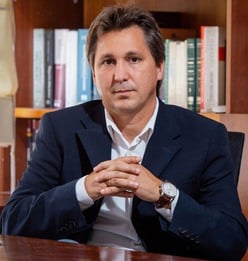

Vice president of compliance and legal counsel | Banco Pichincha Perú



Nelson Bértoli Bryce
Vice president of compliance and legal counsel | Banco Pichincha Perú
How do you approach managing legal aspects during periods of instability or crises, and how does your legal strategy align with the broader business strategy to ensure the organisation’s resilience?
Unfortunately, in Peru, we regularly experience periods of instability, whether due to political, climatic, health, social events, or citizen insecurity. All of which require us, from the legal and compliance position, to accompany the organisation in supporting and ensuring its commercial strategy amidst the inherent uncertainty of crises.
Within the legal strategy, the first priority is to focus on the safety of workers and business operations. Decisions such as the temporary closure of offices or the migration of sales channels and operations with clients must be made quickly and always within the regulatory framework. There are many instances where even the existing regulations do not address the problem, forcing us to obtain regulatory authorisation for what is required.
Additionally, in crisis scenarios, legal assumes greater relevance in the renegotiation of contracts with clients or suppliers, or even with workers when it becomes necessary to suspend certain activities or reduce personnel to enable the organisation to successfully navigate through said crisis periods.
How do you prioritise diversity and inclusion within your legal department, and what initiatives have you implemented to foster a more inclusive and equitable work environment?
I am fortunate to serve as vice president, leading a team comprised of 40 individuals. I have always sought to form a high-performance team capable of providing top-level advice, overseeing hiring, and providing judicial and administrative support, all within a gender-inclusive and equitable environment in terms of salaries and benefits.
My team comprises 56% women, who occupy leadership positions in 48% of existing roles. Additionally, we have ensured a meritocratic system of salary increases, ensuring there is no difference between male and female staff. We focus on building a team where sexual identity is irrelevant for obtaining raises or recognition. We are very proud to be a diverse, inclusive, and highly equitable team, where differences in salaries and positions are explained solely by greater experience, skills, and academic training.
Can you discuss a particularly challenging dispute or M&A scenario you encountered and the innovative strategies you implemented to address it?
I received assignments from three competing companies in the retail sector to lead a merger project aimed at combining efforts and capabilities, integrating the three chains, and creating a new company that now occupies a significant position in the market.
We carried out the integration through a simple reorganisation, in which we segregated a block of assets from each of the three competing companies. These assets comprised merchandise, computer systems, IT platforms, equipment, a network consisting of 160 stores nationwide, and over 1000 people involved, each with different cultures and operating methods.
In Peru, this type of operation represents additional complexity in labour aspects due to the rigidity of the regulation. The project demanded special attention in communication aspects, both from the individuals who were going to accompany us in the new company and from the personnel who unfortunately had to be dismissed. Additionally, we faced complications in the process of valuing contributions that would entail the percentage of ownership in the new company, negotiating existing liabilities in each company, and selecting the management team and the board of directors, seeking to ensure good corporate governance.
Vice president of legal counsel and compliance | Banco Pichincha